Eintracht Braunschweig
 | |||
| Full name |
Braunschweiger Turn- und Sportverein Eintracht von 1895 e.V. | ||
|---|---|---|---|
| Nickname(s) | Die Löwen (The Lions) | ||
| Founded | 15 December 1895 | ||
| Ground |
Eintracht-Stadion, Braunschweig | ||
| Capacity | 23,325 | ||
| Chairman | Sebastian Ebel | ||
| Sporting director | Marc Arnold | ||
| Coach | Torsten Lieberknecht | ||
| League | 2. Bundesliga | ||
| 2015–16 | 8th | ||
| Website | Club home page | ||
|
| |||
Braunschweiger Turn- und Sportverein Eintracht von 1895 e.V., commonly known as Eintracht Braunschweig (German pronunciation: [ˈʔaɪ̯ntʁaxt ˈbʁaʊ̯nʃvaɪ̯k]) or BTSV [beː teː ʔɛs faʊ̯], is a German association football and sports club based in Braunschweig, Lower Saxony. The club was one of the founding members of the Bundesliga in 1963 and won the national title in 1967. Currently, Braunschweig play in the 2. Bundesliga, the second tier of the German football league system.
Since 1923 Eintracht Braunschweig plays at the Eintracht-Stadion. The club shares a rivalry with fellow Lower Saxon side Hannover 96. In addition to the football division, Eintracht has departments for several other sports, of which historically the field hockey department has been the most successful.
History
Foundation and early years
Eintracht Braunschweig was founded as the football and cricket club FuCC Eintracht 1895 in 1895, became FC Eintracht von 1895 in 1906, and changed its name again into SV Eintracht in 1920.
The team has a colorful history and it quickly became one of northern Germany's favorite sides. In 1900 Eintracht Braunschweig was among the founding members of the German Football Association. They enjoyed success early on, playing in the upper tier league, winning the Northern German championship in 1908 and 1913, and placing three players on the German national team by 1914. Under the Third Reich the team played in the Gauliga Niedersachsen and managed two appearances in the national final rounds. In 1942–43, Eintracht Braunschweig went into the national championship play-offs as one of the main favorites.[1] The team under manager Georg "Schorsch" Knöpfle had just won the newly formed Gauliga Südhannover-Braunschweig with a record of 17 wins and one draw in 18 games, scoring 146 goals in the process. After a convincing 5–1 win over Victoria Hamburg in the first round, the draw saw the club paired with the other big favorites for the title, Helmut Schön's Dresdner SC. Dresden won the game held in Dresden with 4–0 and subsequently went on to win the German championship with an undefeated season.[2]
Post-war football
.jpg)
As part of the denazification of Germany after World War II the British authorities dissolved all previously existing sports clubs in Braunschweig and demanded the creation of a single, united sports club for the city. Because of this Eintracht Braunschweig was merged into the new club TSV Braunschweig on 2 November 1945. TSV Braunschweig finally took on the club's current name, Braunschweiger TSV Eintracht von 1895 on 1 April 1949.
The club continued to play in the top division, now the Oberliga Nord after the war, with the exception of a single season (1952–53) spent in tier II. The side was touched by tragedy in 1949 when goalkeeper Gustav Fähland died of internal bleeding a few days after being injured during a game in a collision with a Werder Bremen striker.[3] Another appearance in the final round of the national championship came in 1958.
Bundesliga football 1963 to 1985

Eintracht Braunschweig's consistently high standard of play and financial stability helped it to become one of the sixteen teams selected out of a group of forty-six applicants for play in the Bundesliga, the new federal professional league formed in 1963. Once again the side enjoyed early success, capturing the national title in the 1966–67 season under manager Helmuth Johannsen with solid defensive play. That championship team gave up only 27 goals against, which stood as a Bundesliga record until bettered by Werder Bremen in 1988.[4] Another ten players joined the national side from the team, mostly through the 60's and 70's.
The club was hit by tragedy again during the winter break of the 1968–69 season, when forward Jürgen Moll, aged 29 at the time, and his wife died in a car accident. Two charity matches were played for the benefit of the Molls' children, the first featured West Germany's 1954 FIFA World Cup winning squad in the line-up of the tournament's final, the second saw a combined squad of Eintracht Braunschweig and rivals Hannover 96 take on a Bundesliga all-star team.[5]
The club found itself embroiled in the Bundesliga scandal of 1971, but with a somewhat unusual twist. A number of players accepted payments totaling 40,000 DM – not to underperform and so lose or tie a game, but rather, to put out an extra effort to win.[6] Ultimately, two players were suspended and another ten were fined.
In 1973, in the face of some opposition from the league, Braunschweig became the first Bundesliga side to sport a sponsor logo on their jerseys – that of Wolfenbüttel-based liquor producer Jägermeister. The move paid the team 100,000 DM and introduced a new way of doing business to football that is worth millions today. Other clubs quickly followed suit. Braunschweig's game against Schalke 04 on 24 March 1973 became the first-ever Bundesliga match to feature a club having sponsorship on its jersey.[7] Jägermeister continued to sponsor the club until 1987, although a later attempt to rename the team Eintracht Jägermeister was finally refused by the German Football Association in 1983.[8]
Eintracht Braunschweig just missed a second title in 1977 when they finished third, one point back of champion Borussia Mönchengladbach and just behind second-place finisher FC Schalke 04 on goal difference. The club made news after the season by signing 1974 FIFA World Cup winner Paul Breitner from Real Madrid for a transfer fee of 1,6 million DM. However, Breitner did not fit into the team at all and was sold to Bayern Munich after just one season.[9]

The side counted a casualty in the Cold War in the death of Lutz Eigendorf, who fled East Germany in 1979, where he played for Dynamo Berlin, to come to the west to play for 1. FC Kaiserslautern. Shortly after his transfer to Braunschweig in 1983, he died in a motor vehicle accident which was revealed in 2000 as the assassination of a "traitor" arranged by the Stasi, East Germany's secret police.[10][11]
The club played in the Bundesliga through to the mid-80's having been relegated just twice, playing in the second division in 1973–74 and again in 1980–81. During their run of 322 games in the Bundesliga from 1963 to 1973 they set a record that still stands by not seeing a single player red-carded.[12] In 1984–85 Eintracht Braunschweig was relegated from the Bundesliga for the third time.
Decline
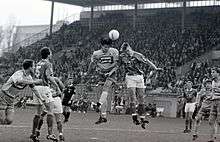
Since the 1985–86 season the side has played at the tier II and III levels. In 1987, Braunschweig managed to set a mark even as they were demoted. They are the only team ever to have been relegated with a positive goal differential: 52 goals for and 47 against. After having been stuck in the Regionalliga for most of the 1990s, Eintracht Braunschweig moved constantly between the 2. Bundesliga and the Regionalliga during the 2000s. At the end of the 2007–2008 Regionalliga season the club was facing a severe crisis, both financially and on the field: Eintracht was in serious danger of missing out on qualification for Germany's new nationwide third-tier league 3. Liga, which would have meant Braunschweig's first ever relegation to the 4th level of the German football league system.
Recent history
However, with their new manager Torsten Lieberknecht, who had only taken over the job a few weeks before,[13] Eintracht Braunschweig managed to qualify for the 3. Liga on the last matchday of the season. Moreover, under Lieberknecht and also newly appointed director of football Marc Arnold, the club continued to steadily improve throughout the next few seasons; a resurgence on and off the field that was widely recognized by the German media.[14][15][16][17][18][19] In 2010–11 the team won promotion back into the 2. Bundesliga as champions of the 3. Liga. There Eintracht Braunschweig re-established themselves quickly, finishing the 2011–12 season comfortably mid-table. 2012–13 should prove even more successful: on the second matchday Braunschweig took over a direct promotion spot and kept it for the rest of the season. On the 31st matchday the club secured its return to the Bundesliga after 28 years in the second and third divisions with a 1–0 away win over FC Ingolstadt 04.
The team finished the 2013–14 Bundesliga season in 18th place and was therefore relegated again after one season in the top-flight. Eintracht Braunschweig had spent most of the season on a relegation spot, but had a chance to stay in the league until the very last matchday. They were officially relegated on 10 May 2014 after a 1–3 loss at TSG 1899 Hoffenheim.
Crest and colours
Colours
Traditionally Eintracht Braunschweig plays their home games in the colours blue and yellow. Those colours are derived from the flag of the Duchy of Brunswick.
|
1963–1964 |
1964–1966 |
1966–1971 |
1971–1981 |
1981–1987 |
Crest
The club's crest contains a red lion on white ground. This symbol is derived from the coat of arms of the city of Braunschweig, which in turn is based on the insignia of Henry the Lion. The club badge went through various different versions during its history, most of the time however it consisted of a circular badge in blue and yellow, with a red lion on a white shield in the center of the circle.
In 1972–73, Eintracht Braunschweig scrapped the original crest and replaced it with a new design based on the logo of their sponsor Jägermeister.[20] This was initially done to get around the German FA's ban on shirt sponsors – a loophole in those rules allowed to club to put a very close looking symbol on their shirt as long as it was the club's official crest. In 1986, after Jägermeister stopped the sponsorship of the club, Eintracht Braunschweig adopted a new, diamond shaped logo containing the traditional red lion as well as the club's colours blue and yellow.
In 2011 the club members voted to return to the club's more traditional round crest. In March 2012 the club then presented the new version of the crest, which was adopted as the official logo at the start of the 2012–13 season.[21] During the 2016–17 season, the club wore a special anniversary crest, to commemorate the 50th anniversary of the club's 1966–67 Bundesliga title.[22]
 Flag of the Duchy of Brunswick
Flag of the Duchy of Brunswick Coat of arms of Braunschweig
Coat of arms of Braunschweig.svg.png) Historical version of the round logo, in use during the 1960s and early 70s
Historical version of the round logo, in use during the 1960s and early 70s.svg.png) Diamond shaped logo, in use 1986–2012
Diamond shaped logo, in use 1986–2012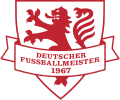 Anniversary crest, worn during the 2016–17 season
Anniversary crest, worn during the 2016–17 season
Stadium
Eintracht Braunschweig plays at the Eintracht-Stadion in Braunschweig, built in 1923. Currently the stadium has a capacity of ca. 25,000, during the 1960s it held up to 38,000 people.[23] Before the construction of the Eintracht-Stadion, the club played its home games at Sportplatz an der Helmstedter Straße, which held 3,000 people.[23]
Supporters
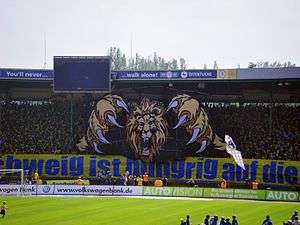
Despite spending recent years in the lower divisions, the club's fan support has remained strong: with 21,396 per game Eintracht Braunschweig had the 24th highest average attendance of any sports team in Germany during the 2011–12 season.[24]
Eintracht Braunschweig has a strong rivalry with Hannover 96,[25][26][27][28] while friendly fan relations exist with 1. FC Magdeburg,[29] SV Waldhof Mannheim,[30] and FC Basel.[31]
Recent seasons
| Year | Division | Position |
| 1999–2000 | Regionalliga Nord (III) | 3rd |
| 2000–01 | Regionalliga Nord | 8th |
| 2001–02 | Regionalliga Nord | 2nd (promoted) |
| 2002–03 | 2. Bundesliga (II) | 15th (relegated) |
| 2003–04 | Regionalliga Nord (III) | 6th |
| 2004–05 | Regionalliga Nord | 1st (promoted) |
| 2005–06 | 2. Bundesliga (II) | 12th |
| 2006–07 | 2. Bundesliga | 18th (relegated) |
| 2007–08 | Regionalliga Nord (III) | 10th |
| 2008–09 | 3. Liga (III) | 13th |
| 2009–10 | 3. Liga | 4th |
| 2010–11 | 3. Liga | 1st (promoted) |
| 2011–12 | 2. Bundesliga (II) | 8th |
| 2012–13 | 2. Bundesliga | 2nd (promoted) |
| 2013–14 | Bundesliga | 18th (relegated) |
| 2014–15 | 2. Bundesliga | 6th |
| 2015–16 | 2. Bundesliga | 8th |
League history
Between 1904 and 1985 Eintracht Braunschweig spent all but three seasons in Germany's top division. Between 1985 and 2013, the club then alternated between the second and third level of the German league pyramid, before returning to the top flight for the first time in 28 years at the end of the 2012–13 season.

Honours
- League
- Bundesliga:
- Champions: 1966–67
- 2. Bundesliga (II):2
- Runners-up: 1980–81, 2012–13
- 3. Liga (III):
- Champions: 2010–11
- Northern German championship:
- Champions: 1907–08, 1912–13
- Gauliga Südhannover-Braunschweig:
- Champions: 1942–43, 1943–44
- Oberliga Niedersachsen-Süd:
- Champions: 1945–46, 1946–47
- Südkreisliga/Bezirksliga Südhannover-Braunschweig/Oberliga Südhannover-Braunschweig:
- Champions: 1923–24, 1924–25
- Duchy/Free State of Brunswick championship:1
- Champions: 1904–05, 1905–06, 1906–07, 1907–08, 1908–09, 1909–10, 1910–11, 1911–12, 1912–13, 1915–16, 1916–17, 1917–18, 1919–20
- Regionalliga Nord (II):
- Champions: 1973–74
- Amateuroberliga Niedersachsen-Ost (II):
- Champions: 1952–53
- Regionalliga Nord (III):
- Champions: 2004–05
- Amateur-Oberliga Nord (III):
- Champions: 1987–88
1No championship played in 1914 and 1915. 2Includes 2. Bundesliga Nord (1974–81).
- Cup
- Lower Saxony Cup:
- Winners: 2003–04, 2010–11
- Runners-up: 1998–99, 2008–09
- International
- Intertoto Cup:
- Group winners: 1968, 1970, 1971, 1972, 1975, 1978, 1979
European record
| Season | Competition | Round | Nation | Club | Home | Away | Aggregate | Result |
|---|---|---|---|---|---|---|---|---|
| 1967–68 | European Cup | 1st round | Dinamo Tirana | – | – | Win | ||
| 2nd round | Rapid Vienna | 2–0 | 0–1 | Win | ||||
| Quarter-finals | Juventus | 3–2 | 0–1 | Loss | ||||
| 1971–72 | UEFA Cup | 1st round | Glentoran | 6–1 | 1–0 | Win | ||
| 2nd round | Atlético Bilbao | 2–1 | 2–2 | Win | ||||
| 3rd round | Ferencváros | 1–1 | 2–5 | Loss | ||||
| 1976–77 | UEFA Cup | 1st round | Holbæk B&I | 7–0 | 0–1 | Win | ||
| 2nd round | RCD Español | 2–1 | 0–2 | Loss | ||||
| 1977–78 | UEFA Cup | 1st round | Dinamo Kiev | 0–0 | 1–1 | Win | ||
| 2nd round | IK Start | 4–0 | 0–1 | Win | ||||
| 3rd round | PSV Eindhoven | 1–2 | 0–2 | Loss |
1 Juventus beat Eintracht Braunschweig 1–0 in a play-off in Berne, Switzerland to reach the semi-finals.
2 Eintracht Braunschweig progressed to the second round on away goals.
Intertoto Cup record
| Season | Competition | Round | Nation | Club | Home | Away |
|---|---|---|---|---|---|---|
| 1964–65 | International Football Cup | Group A2 | DWS Amsterdam | 2–0 | 0–4 | |
| Group A2 | FC La Chaux-de-Fonds | 1–1 | 0–2 | |||
| Group A2 | Beringen FC | 2–1 | 3–2 | |||
| 1965–66 | International Football Cup | Group A4 | Örgryte IS | 3–0 | 1–3 | |
| Group A4 | Sparta Rotterdam | 1–2 | 0–3 | |||
| Group A4 | FC Luzern | 7–0 | 4–4 | |||
| 1966–67 | International Football Cup | Group B3 | Górnik Zabrze | 8–0 | 0–4 | |
| Group B3 | Carl Zeiss Jena | 1–2 | 1–2 | |||
| Group B3 | AIK | 5–1 | 2–0 | |||
| 1968 | Intertoto Cup | Group B7 | Lausanne-Sports | 2–1 | 1–4 | |
| Group B7 | Wacker Innsbruck | 3–1 | 2–1 | |||
| Group B7 | AB | 2–0 | 0–0 | |||
| 1970 | Intertoto Cup | Group B1 | Grasshopper Club | 2–0 | 1–5 | |
| Group B1 | IFK Norrköping | 1–0 | 2–2 | |||
| Group B1 | Wiener SC | 3–0 | 1–1 | |||
| 1971 | Intertoto Cup | Group 6 | Malmö FF | 0–1 | 1–0 | |
| Group 6 | Zagłębie Wałbrzych | 1–0 | 1–0 | |||
| Group 6 | Young Boys | 2–0 | 5–1 | |||
| 1972 | Intertoto Cup | Group 6 | TJ ZVL Žilina | 5–0 | 1–1 | |
| Group 6 | Landskrona BoIS | 2–0 | 0–3 | |||
| Group 6 | Vejle BK | 4–1 | 3–0 | |||
| 1973 | Intertoto Cup | Group 9 | AC Nitra | 1–2 | 1–1 | |
| Group 9 | FC Amsterdam | 1–4 | 0–0 | |||
| Group 9 | Vejle BK | 0–3 | 2–0 | |||
| 1975 | Intertoto Cup | Group 3 | FK Vojvodina | 2–1 | 1–3 | |
| Group 3 | FC Zürich | 2–0 | 0–1 | |||
| Group 3 | Vejle BK | 3–0 | 5–0 | |||
| 1976 | Intertoto Cup | Group 4 | Baník Ostrava | 0–2 | 0–0 | |
| Group 4 | SSW Innsbruck | 1–1 | 0–1 | |||
| Group 4 | AIK | 2–1 | 3–1 | |||
| 1978 | Intertoto Cup | Group 4 | Standard Liège | 0–1 | 1–0 | |
| Group 4 | Grasshopper Club | 0–0 | 2–0 | |||
| Group 4 | B 1903 | 5–1 | 2–1 | |||
| 1979 | Intertoto Cup | Group 3 | Malmö FF | 3–1 | 2–2 | |
| Group 3 | Slavia Prague | 2–0 | 1–1 | |||
| Group 3 | FC St. Gallen | 3–2 | 4–1 | |||
| 1983 | Intertoto Cup | Group 10 | TJ Vítkovice | 0–2 | 2–2 | |
| Group 10 | Trakia Plovdiv | 2–0 | 1–0 | |||
| Group 10 | IF Elfsborg | 4–0 | 0–1 | |||
| 1984 | Intertoto Cup | Group 4 | Standard Liège | 3–1 | 1–4 | |
| Group 4 | OB | 0–0 | 1–1 | |||
| Group 4 | Go Ahead Eagles | 2–1 | 1–2 | |||
| 1985 | Intertoto Cup | Group 5 | Wismut Aue | 2–1 | 2–3 | |
| Group 5 | Slavia Prague | 4–1 | 0–4 | |||
| Group 5 | Viking FK | 6–3 | 1–2 |
Players
Current squad
As of 23 August 2016 Note: Flags indicate national team as defined under FIFA eligibility rules. Players may hold more than one non-FIFA nationality.
|
|
Players out on loan
Note: Flags indicate national team as defined under FIFA eligibility rules. Players may hold more than one non-FIFA nationality.
|
Notable former players
The list includes players with at least 250 games or 50 goals for Eintracht Braunschweig's first team, as well as players with at least one cap for their country's national or Olympic football team. However, players who did not receive any of their caps whilst playing for Eintracht Braunschweig are only included if they made at least 10 appearances for the club.
- Germany
 Holger Aden (1989–1992)
Holger Aden (1989–1992) Joachim Bäse (1959–1973)
Joachim Bäse (1959–1973) Karim Bellarabi (2008–2011, 2013–2014)
Karim Bellarabi (2008–2011, 2013–2014) Paul Breitner (1977–1978)
Paul Breitner (1977–1978) Ludwig Bründl (1971–1975)
Ludwig Bründl (1971–1975) Bernd Buchheister (1985–1993)
Bernd Buchheister (1985–1993)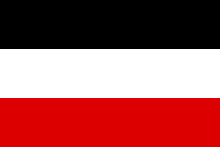 Konrad "Otto" Bülte (1903–1911)
Konrad "Otto" Bülte (1903–1911) Bernd Dörfel (1968–1970)
Bernd Dörfel (1968–1970) Wolfgang Dremmler (1973–1979)
Wolfgang Dremmler (1973–1979) Dietmar Erler (1970–1981)
Dietmar Erler (1970–1981) Wolfgang Frank (1974–1978)
Wolfgang Frank (1974–1978) Bernd Franke (1971–1985)
Bernd Franke (1971–1985) Willi Fricke (1938–1952)
Willi Fricke (1938–1952) Bernd Gersdorff (1969–1977)
Bernd Gersdorff (1969–1977) Klaus Gerwien (1961–1974)
Klaus Gerwien (1961–1974) Wolfgang Grzyb (1966–1978)
Wolfgang Grzyb (1966–1978) Friedhelm Haebermann (1969–1978)
Friedhelm Haebermann (1969–1978) Otto Harder (1909–1913)
Otto Harder (1909–1913) Winfried Herz (1951–1961)
Winfried Herz (1951–1961) Reiner Hollmann (1973–1984)
Reiner Hollmann (1973–1984) Hans Jäcker (1956–1967)
Hans Jäcker (1956–1967) Peter Kaack (1963–1973)
Peter Kaack (1963–1973) Dennis Kruppke (2008–2015)
Dennis Kruppke (2008–2015) Ludwig Lachner (1934–1949)
Ludwig Lachner (1934–1949) Max Lorenz (1969–1972)
Max Lorenz (1969–1972) Peter Lux (1981–1985, 1990–1993)
Peter Lux (1981–1985, 1990–1993) Erich Maas (1964–1970)
Erich Maas (1964–1970) Franz Merkhoffer (1968–1984)
Franz Merkhoffer (1968–1984) Jürgen Moll (1957–1968)
Jürgen Moll (1957–1968) Harald Nickel (1978–1979)
Harald Nickel (1978–1979) Walter Poppe (1904–1912)
Walter Poppe (1904–1912) Richard Queck (1907–1914)
Richard Queck (1907–1914) Tobias Rau (1999–2001)
Tobias Rau (1999–2001) Uwe Reinders (1987–1988)
Uwe Reinders (1987–1988) Walter Schmidt (1959–1969)
Walter Schmidt (1959–1969) Dirk Schuster (1990–1991)
Dirk Schuster (1990–1991) Albert Sukop (1930–1948)
Albert Sukop (1930–1948) Werner Thamm (1950–1962)
Werner Thamm (1950–1962) Lothar Ulsaß (1964–1971)
Lothar Ulsaß (1964–1971) Horst Wolter (1961–1972)
Horst Wolter (1961–1972) Ronald Worm (1979–1987)
Ronald Worm (1979–1987) Heinz Wozniakowski (1951–1958)
Heinz Wozniakowski (1951–1958) Dieter Zembski (1975–1980)
Dieter Zembski (1975–1980)
- International
 Mushaga Bakenga (2014–2015)
Mushaga Bakenga (2014–2015)
 Ihor Belanov (1991–1994)
Ihor Belanov (1991–1994) Magnús Bergs (1984–1985)
Magnús Bergs (1984–1985) Ermin Bičakčić (2012–2014)
Ermin Bičakčić (2012–2014) Hasse Borg (1977–1983)
Hasse Borg (1977–1983)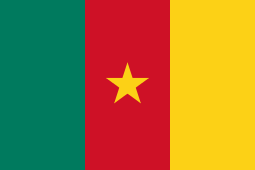 Serge Branco (1998–2000)
Serge Branco (1998–2000) Tommy Christensen (1988–1989)
Tommy Christensen (1988–1989) Daniel Davari (2009–2014)
Daniel Davari (2009–2014) Fahed Dermech (1999–2000)
Fahed Dermech (1999–2000) Randy Edwini-Bonsu (2011–2013)
Randy Edwini-Bonsu (2011–2013) Omar Elabdellaoui (2013–2014)
Omar Elabdellaoui (2013–2014)
 Sergei Fokin (1992–2000)
Sergei Fokin (1992–2000)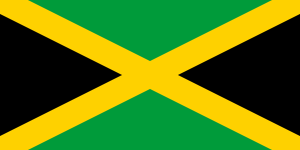 Milton Griffiths (2000–2001)
Milton Griffiths (2000–2001) Vegar Eggen Hedenstad (2014–2015)
Vegar Eggen Hedenstad (2014–2015) Reinhold Hintermaier (1984–1986)
Reinhold Hintermaier (1984–1986) Rudi Istenič (2001–2002)
Rudi Istenič (2001–2002) Simeon Jackson (2013)
Simeon Jackson (2013) Bent Jensen (1972–1973)
Bent Jensen (1972–1973) Bekim Kastrati (2006–2007)
Bekim Kastrati (2006–2007) Yahiro Kazama (1988–1989)
Yahiro Kazama (1988–1989)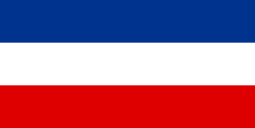 Miloš Kolaković (1995–2001)
Miloš Kolaković (1995–2001) Jameleddine Limam (1990–1991)
Jameleddine Limam (1990–1991) Mohamed Ali Mahjoubi (1991–1993)
Mohamed Ali Mahjoubi (1991–1993).svg.png) Michél Mazingu-Dinzey (2002–2004)
Michél Mazingu-Dinzey (2002–2004) Allan Michaelsen (1972–1974)
Allan Michaelsen (1972–1974) Valentin Năstase (2007–2009)
Valentin Năstase (2007–2009) Håvard Nielsen (2014–2015)
Håvard Nielsen (2014–2015)
 Viktor Pasulko (1993–1996)
Viktor Pasulko (1993–1996)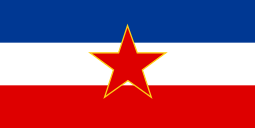 Danilo Popivoda (1975–1981)
Danilo Popivoda (1975–1981) Horst Rick (1960–1961)
Horst Rick (1960–1961) André Schembri (2007–2008)
André Schembri (2007–2008) Damir Vrančić (2009–2016)
Damir Vrančić (2009–2016)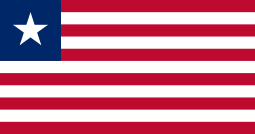 Josephus Yenay (2000–2001)
Josephus Yenay (2000–2001) Ilija Zavišić (1980–1984)
Ilija Zavišić (1980–1984) Zhang Chengdong (2012–2013)
Zhang Chengdong (2012–2013)
Staff
Current technical staff
| Position | Name |
|---|---|
| Head coach | Torsten Lieberknecht |
| Assistant coach | Darius Scholtysik |
| Assistant coach | Henning Bürger |
| Athletic trainer | Jürgen Rische |
| Goalkeeping coach | Alexander Kunze |
| Sporting director | Marc Arnold |
| Physiotherapist | Günter Jonczyk |
| Physiotherapist | Goce Janevski |
| Physiotherapist | Philipp Glawe |
| Club doctor | Stephan Bornhardt |
| Club internist | Friedrich Scheibe |
| Team manager | Holm Stelzer |
| Kit and equipment manager/Bus driver | Christian Skolik |
Manager history
Caretaker managers in italics.
|
|
|
Notable former presidents
The list includes former presidents and chairmen of Eintracht Braunschweig who have their own Wikipedia article.
|
Records
- Home victory, Bundesliga: 6–0 v Rot-Weiss Essen, 21 May 1977/6–0 v VfB Stuttgart, 5 April 1975[32]
- Away victory, Bundesliga: 7–1 v Arminia Bielefeld, 28 June 1972[32]
- Home loss, Bundesliga: 0–6 v Borussia Mönchengladbach, 29 October 1977[32]
- Away loss, Bundesliga: 0–10 v Borussia Mönchengladbach, 11 October 1984[32]
- Most appearances, all competitions total: 563, Franz Merkhoffer 1968–1984[33]
- Most appearances, Bundesliga: 419, Franz Merkhoffer 1968–1984[32]
- Most goals scored, total: 116, Werner Thamm 1950–1962[33]
- Most goals scored, Bundesliga: 84, Lothar Ulsaß 1964–1971[32]
- Most goals scored, season, Bundesliga: 24, Wolfgang Frank, 1976–77[32]
- Most goals scored, season, 2. Bundesliga: 30, Ronald Worm, 1980–81[32]
Reserve and youth teams
Reserve team
Eintracht Braunschweig II, historically also referred to as Eintracht Braunschweig Amateure, currently plays in the Regionalliga Nord. The team's current manager is Henning Bürger.
Eintracht Braunschweig II squad
As of 30 September 2016[34] Note: Flags indicate national team as defined under FIFA eligibility rules. Players may hold more than one non-FIFA nationality.
|
|
Honours
- German amateur championship:
- Runners-up (1): 1970
- Amateuroberliga Niedersachsen-Ost (II):
- Champions (1): 1956
- Runners-up (1): 1955
- Amateurliga Niedersachsen, Staffel 4 (Braunschweig) (III):
- Champions (1): 1954
- Lower Saxony championship:
- Champions (5): 1970, 2000, 2002, 2010, 2013[35]
- Runners-up (2): 1985, 2005
Youth
The club's Under-19 and Under-17 teams play in the Under 19 Bundesliga and the Under 17 Bundesliga respectively in the 2014–15 season. The club's youth academy is located at the Sportpark Kennel near Schloss Richmond.
Other sports
As a multi sports club Eintracht Braunschweig also has departments for athletics, basketball, chess, darts, field hockey, gymnastics, team handball, swimming and water polo, tennis, and winter sports. The club was especially successful in athletics and swimming from the 1940s until the 1960s, with the club's athletes, among them the then-current 800 metres world record holder Rudolf Harbig, winning over 40 national championships during that period.[36]
Field hockey
The field hockey department historically has been one of Eintracht Braunschweig's most successful sections. Eintracht's women's field hockey team has won numerous titles, mostly during the 1970s.
Honours
National
- German women's championship (outdoor):
- Champions (6): 1965, 1969, 1974, 1975, 1976, 1978
- Runners-up (2): 1964, 1977
- German women's championship (indoor):
- Champions (3): 1973, 1974, 1975
- Runners-up (4): 1970, 1978, 1983, 2003
International
- Women's EuroHockey Club Champions Cup (outdoor):
- Runners-up (3): 1975, 1976, 1977
Notable players
Ice hockey
Eintracht Braunschweig's ice hockey department was founded in 1981. After years in the lower divisions, the team played its first and only season in Germany's second division, then named 1. Liga, in 1997–1998. In 2000 the ice hockey section became independent as Eintracht Braunschweig Eissport e.V., and eventually dissolved in 2003.
Basketball
Eintracht Braunschweig's basketball department was founded in 1956. The club's women's team currently plays in the 2. Damen-Basketball-Bundesliga, the second tier of women's basketball in Germany.
In popular culture
The German 2009 drama film 66/67: Fairplay Is Over (German: 66/67: Fairplay war gestern) tells the story of a group of Eintracht Braunschweig hooligans. The title is a reference to Eintracht's championship winning season 1966–67, as well as the name of the fictional supporters club the characters in the film belong to.[37]
In 2008 the German jazz funk/hip hop band Jazzkantine produced a musical about Eintracht Braunschweig, titled Unser Eintracht, in cooperation with the Staatstheater Braunschweig.[38]
Bibliography
- Bläsig, Horst; Leppert, Alex (2010). Ein Roter Löwe auf der Brust – Die Geschichte von Eintracht Braunschweig. Göttingen: Die Werkstatt. ISBN 978-3-89533-675-1.
- Buchal, Andreas (2007). Eintracht Braunschweig vs Hannover 96. Über die Rivalität zweier Traditionsvereine. Wolfsburg: Verlag Günther Hempel. ISBN 978-3-87327-040-4.
- Döring, Jochen (1967). Spiele, Tore, Meisterschaft. Eintracht Braunschweig in der Bundesligasaison 1966/67. Braunschweig: Karl Pfannkuch-Verlag.
- Döring, Jochen (1995). Helmut, laß die Löwen raus! Triumphe und Tränen, Stars und Skandale. 100 Jahre Fußball, Eintracht Braunschweig. Braunschweig: Braunschweiger Zeitungsverlag.
- Gizler, Gerhard (2015). Es ist für’s Vaterland, wenn’s auch nur Spiel erscheint. Studien zur Geschichte von Eintracht Braunschweig in der NS-Zeit. Göttingen: Die Werkstatt. ISBN 978-3-7307-0243-7.
- Göttner, Christian (2007). Was geht, Eintracht Braunschweig? Deutscher Fußballmeister 1967. 67 Interviews mit legendären Fußballern. Kassel: Agon-Sportverlag. ISBN 978-3-89784-336-3.
- Graßhof, Heinz (1967). Eintracht Braunschweig. Porträt einer Bundesliga-Mannschaft. Braunschweig: Graff und Grenzland.
- Klingenberg, Axel (2013). 111 Gründe, Eintracht Braunschweig zu lieben. Eine Liebeserklärung an den großartigsten Fußballverein der Welt. Berlin: Schwarzkopf & Schwarzkopf Verlag. ISBN 978-3-8626-5280-8.
- Leppert, Alex (2016). Der Weg zum Titel. So wurde Eintracht Braunschweig Deutscher Fussballmeister 1967. Peine: Madsack Medien Ostniedersachsen. ISBN 978-3-00-055075-1.
- Peters, Stefan (1998). Eintracht Braunschweig. Die Chronik. Kassel: Agon-Sportverlag. ISBN 978-3-89609-152-9.
- Peters, Stefan; Göttner, Christian (2013). 100 Spiele Eintracht. Die emotionalsten Partien der Vereinsgeschichte von Eintracht Braunschweig. Göttingen: Die Werkstatt. ISBN 978-3-7307-0052-5.
- Pollmann, Ulrike (1995). In frischer Kraft und selbstbewußt... 100 Jahre Eintracht Braunschweig. Braunschweig: Verlag Michael Kuhle. ISBN 3-923696-72-8.
References
- ↑ Peters, Stefan (1998). Eintracht Braunschweig. Die Chronik (in German). Agon-Sportverlag. p. 43.
- ↑ "Unbeaten during a League Season". rsssf.com. Retrieved 20 January 2013.
- ↑ "Stadtchronik Braunschweig: 1949" (in German). braunschweig.de. Retrieved 2013-08-28.
- ↑ "Charting the rise, fall and rise of Eintracht Braunschweig". Newstalk. 28 September 2013. Retrieved 30 November 2016.
- ↑ "Jürgen Moll – Ein junger Eintracht-Held" (in German). ndr.de. Retrieved 13 December 2012.
- ↑ "Zehn Fakten über Eintracht Braunschweig" (in German). Stuttgarter Zeitung. 15 December 2015. Retrieved 4 December 2016.
- ↑ "Der Hirsch des Anstoßes" (in German). Süddeutsche Zeitung. 30 July 2003. Retrieved 21 August 2011.
- ↑ "Eintracht Jägermeister" (in German). Der Tagesspiegel. 28 February 2003. Retrieved 9 December 2012.
- ↑ "Breitner – viele Mitspieler schnitten ihn, die Touristen liebten ihn" (in German). Braunschweiger Zeitung. 25 July 2009. Retrieved 1 February 2013.
- ↑ "The curious case of Lutz Eigendorf – Part 1". ESPN Soccernet. Retrieved 9 December 2012.
- ↑ "The curious case of Lutz Eigendorf – Part 2". ESPN Soccernet. Retrieved 9 December 2012.
- ↑ Gisler, Omar (2012). Das große Buch der Fußball-Rekorde: Superlative, Kuriositäten, Sensationen (in German). Copress Verlag. p. 253. ISBN 978-3-7679-1080-5.
- ↑ "Eintracht-Trainer Möhlmann gibt auf" (in German). braunschweiger-zeitung.de. Retrieved 9 December 2012.
- ↑ "Die ewige Tochter blüht wieder auf" (in German). spiegel.de. Retrieved 9 December 2012.
- ↑ "Im Zweifel gegen den Trend" (in German). faz.net. Retrieved 9 December 2012.
- ↑ "Auferstanden vom Rande des Untergangs" (in German). sueddeutsche.de. Retrieved 9 December 2012.
- ↑ "Spagat auf der Baustelle" (in German). fr-online.de. Retrieved 9 December 2012.
- ↑ "Kein Geld – und trotzdem erfolgreich" (in German). zeit.de. Retrieved 18 December 2012.
- ↑ "Braunschweigs großer Klimmzug" (in German). welt.de. Retrieved 7 April 2013.
- ↑ "Die Schnapsidee" (in German). Der Spiegel. 5 December 1983. Retrieved 4 December 2016.
- ↑ Eintracht Braunschweig zurück zum Traditionswappen (German), published: 14 March 2012, accessed: 28 March 2012
- ↑ "Eintracht startet in die Jubiläumssaison" (in German). eintracht.com. Retrieved 23 August 2016.
- 1 2 Stadion: Geschichte (German), accessed: 17 April 2012
- ↑ Stadionwelt-fans.de: Top 100 attendances in German sports (German), published: 7 May 2012, accessed: 4 June 2012
- ↑ "Local hero Torsten Lieberknecht draws praise for his Eintracht Braunschweig approach from Borussia Dortmund manager Jürgen Klopp". The Independent. 8 November 2013. Retrieved 30 November 2016.
- ↑ "Braunschweig - Hannover: Rivalen aus Tradition" (in German). ndr.de. Retrieved 2 December 2016.
- ↑ "Verfeindet seit 1636" (in German). faz.net. Retrieved 7 November 2013.
- ↑ "Schalke gegen Dortmund ist Kleinkram dagegen" (in German). kicker.de. Retrieved 7 November 2013.
- ↑ "Lieberknecht: Wir hoffen, dass viele Leute nach Magdeburg kommen." (in German). eintracht.com. 5 September 2013. Retrieved 2 December 2016.
- ↑ "Zwei neue Testspiele" (in German). bundesliga.de. 19 August 2011. Retrieved 2 December 2016.
- ↑ "Eintracht-Fans wollen Basel-Spiel boykottieren" (in German). Braunschweiger Zeitung. 29 January 2015. Retrieved 2 December 2016.
- 1 2 3 4 5 6 7 8 "Eintracht Braunschweig - Historie" (in German). kicker.de. Retrieved 30 November 2016.
- 1 2 Bläsig, Horst; Leppert, Alex (2010). Ein Roter Löwe auf der Brust. Die Geschichte von Eintracht Braunschweig (in German). Die Werkstatt. p. 395.
- ↑ "Eintracht Braunschweig II" (in German). kicker.de. 2016. Retrieved 29 July 2016.
- ↑ Lower Saxony: List of champions and cup winners (German), published: 16 August 2011, accessed: 12 April 2012
- ↑ Hoffmeister, Kurt (1986). Meister und Medaillen. Braunschweigs Olympiasieger, Welt-, Europa-, Deutsche Meister 1946–1986 (in German). Stadtbibliothek Braunschweig. p. 63.
- ↑ "German cinema: 66/67 – Fairplay war gestern". berlinale.de. Retrieved 20 July 2013.
- ↑ Unser Eintracht (German), accessed: 23 April 2012
External links
| Wikimedia Commons has media related to Eintracht Braunschweig. |